山村訓長但知覓
The Sanchon Hunjang(usually clicking on the photos yields an enlarged version)
9/30/2005
I'll give you a hint, it's not 오뎅
The Sanchon Hunjang has a little quiz for you. What do you guess is the title (and hence the topic) of the following poem by 鄭谷 정곡 (849-911) of the late Tang dynasty (618-907).
What is it that gives the ants difficulty in finding their hole while making it easier for the birds to find their nests? What could the monks not care less about en masse while those of us in the mundane world get upset over just one?
Yep, that's right, the answer is falling leaves.
There are a few common symbols for autumn. On the positive side, there are blooming chrysanthemums as well as the vivid foliage of maples and ginkgos. Then there is the fact that all deciduous trees drop their leaves, which reminds people (especially those of a sentimental bent, like poets) of their mortality.
Among all those trees, the favorite example of falling leaves, at least among 한학자, is the paulownia, or 梧桐 오동. 오동, not to be confused with 우동, is fast and straight growing tree that produces pods of many seeds that were used for packing material or burned to make a premium grade of ink, while the wood was used for furniture and other carpentry projects. The paulownia was to the Chinese apparently something akin to what the buffalo was to the American Indians. Paulownia timber may not taste as good as buffalo pemmican, but they're equally tough and dry in the mouth. The paulownia, however, has an edge over the buffalo because it was believed to be the only tree where the mythical 鳳凰 봉황 (unfortunately translated as "phoenix" sometimes) would alight. This is an advantage because the 봉황 heralds the birth of a sage, thus it's use in Korea's presidential symbol:
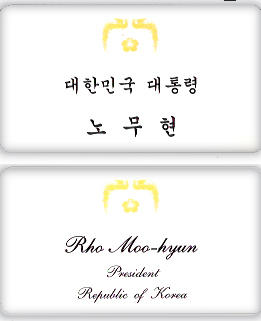
There is a Paulownia Island at the southern port of 여수, but if you should go there in search of paulownia trees, you would come away disappointed. There is not a single 그루! They have 동백꽃, instead.
At any rate, here is what those 오동 leaves look like:
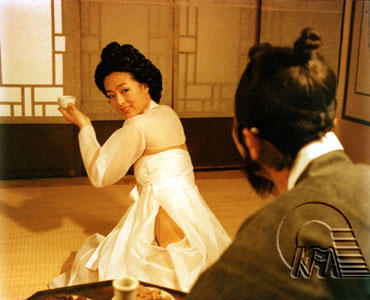
Oops...how did that get in there...um...as you can see...uh...that's 어우동, and it looks like she's already shed a leaf or two...
Let's try that again:
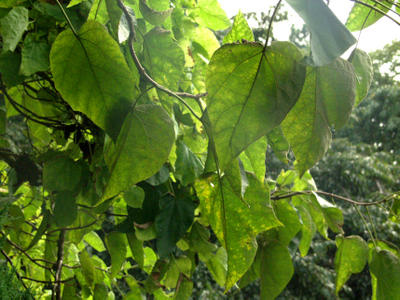
Ah, yes, there we go. The leaves take an elongated heart shape. I'll bet you're itching to see how poets use this tree to signal the arrival of fall. Well itch no further:
Fall came so abruptly that it surprised the paulownia tree in his garden, causing it to suddenly drop its leaves, and reminding the author that autumn is here for real (he is calculatingly ambiguous about whether it is this year's fall, or the autumn of life that upsets him so). There is no more chance to enjoy water sports.
The reason that the paulownia has become a favorite symbol for fall is that it drops its leaves at the very beginning of the season. Some commentators say that it is also because the size of the paulownia leaf is so big (in China, at least, up to a meter across!) that even one really catches your eye. As this young lad kindly demonstrates, a monstrous leaf or two falling make a good hint that autumn has really arrived.
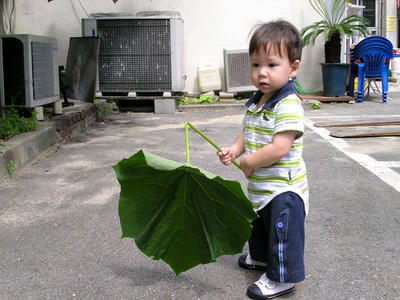
A sidewalk strewn with leaves this size would make my hole hard to find!
返蟻難尋穴, Retiring ants have difficulty finding their hole,
歸禽易見巢. As returning birds easily see their nests.
滿廊僧不厭, Though they fill the halls, bonzes are not bothered,
一個俗嫌多. Yet even one the secular man hates as being too many.
☞ 返: 돌아올 반, 蟻: 개미 의, 難: 어려울 난, 尋: 찾을 심, 穴: 구멍 혈.
歸: 돌아갈 귀, 禽: 날짐승 금, 易: 쉬울 이, 見: 볼 견, 巢: 집(nest) 소.
滿: 찰 만, 廊: 복도 랑, 僧: 종 승, 不: 아니 불, 厭: 싫을 염.
一: 한 일, 個: 낱 개, 俗: 속될 속, 嫌: 싫어할 혐, 多: 많을 다.
What is it that gives the ants difficulty in finding their hole while making it easier for the birds to find their nests? What could the monks not care less about en masse while those of us in the mundane world get upset over just one?
Yep, that's right, the answer is falling leaves.
There are a few common symbols for autumn. On the positive side, there are blooming chrysanthemums as well as the vivid foliage of maples and ginkgos. Then there is the fact that all deciduous trees drop their leaves, which reminds people (especially those of a sentimental bent, like poets) of their mortality.
Among all those trees, the favorite example of falling leaves, at least among 한학자, is the paulownia, or 梧桐 오동. 오동, not to be confused with 우동, is fast and straight growing tree that produces pods of many seeds that were used for packing material or burned to make a premium grade of ink, while the wood was used for furniture and other carpentry projects. The paulownia was to the Chinese apparently something akin to what the buffalo was to the American Indians. Paulownia timber may not taste as good as buffalo pemmican, but they're equally tough and dry in the mouth. The paulownia, however, has an edge over the buffalo because it was believed to be the only tree where the mythical 鳳凰 봉황 (unfortunately translated as "phoenix" sometimes) would alight. This is an advantage because the 봉황 heralds the birth of a sage, thus it's use in Korea's presidential symbol:

There is a Paulownia Island at the southern port of 여수, but if you should go there in search of paulownia trees, you would come away disappointed. There is not a single 그루! They have 동백꽃, instead.
At any rate, here is what those 오동 leaves look like:

Oops...how did that get in there...um...as you can see...uh...that's 어우동, and it looks like she's already shed a leaf or two...
Let's try that again:

Ah, yes, there we go. The leaves take an elongated heart shape. I'll bet you're itching to see how poets use this tree to signal the arrival of fall. Well itch no further:
〈秋懷〉鄭鎔 (정용) "Autumn Feelings" by ChOng Yong (c. 1587)
菊垂雨中花, The chrysanthemum droops down its rain-filled flowers,
秋驚庭上梧. As autumn startles the paulownia in the garden.
今朝倍惆悵, But this morning doubles my sadness,
昨夜夢江湖. For last night I dreamt of the rivers and lakes [that I had earlier enjoyed traveling to].
☞ 秋: 가을 추, 懷: 품을 회.
菊: 국화 국, 垂: 드리울 수, 雨: 비 우, 中: 가운데 중, 花: 꽃 화.
驚: 놀랄 경, 庭: 뜰 정, 上: 위 상, 梧: 오동나무 오
今: 이제 금, 朝: 아침 조, 倍: 곱 배, 惆: 실심할 추, 悵: 슬퍼할 창창
昨: 어제 작, 夜: 밤 야, 夢: 꿈 몽, 江: 강물 강, 湖: 호수 호.
Fall came so abruptly that it surprised the paulownia tree in his garden, causing it to suddenly drop its leaves, and reminding the author that autumn is here for real (he is calculatingly ambiguous about whether it is this year's fall, or the autumn of life that upsets him so). There is no more chance to enjoy water sports.
The reason that the paulownia has become a favorite symbol for fall is that it drops its leaves at the very beginning of the season. Some commentators say that it is also because the size of the paulownia leaf is so big (in China, at least, up to a meter across!) that even one really catches your eye. As this young lad kindly demonstrates, a monstrous leaf or two falling make a good hint that autumn has really arrived.

A sidewalk strewn with leaves this size would make my hole hard to find!
9/28/2005
Retching hills
I'm pretty sure that everyone has had the fun experience of dodging sidewalk pizzas left over from Friday evening revelers. Oh how the Sanchon Hunjang enjoys that weekend morning activity.
Anyway, there's that funny word that Koreans use to mean "to vomit," 오바이트. Most Koreans are convinced that this is the English word for the same action. The Sanchon Hunjang can't even count the number of times that someone has been telling a story that has vomiting in it, they get to that part, make a vivid hand motion...
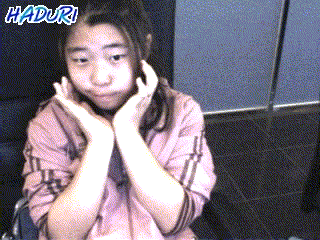
...and then say "있잖아, 오바이트."
Everyone probably knows that the real Korean words to describe this are 토하다 and the somewhat clinical sounding 구토하다. Either way, that would be 吐: 토할 토. Some people may want to go on at some length about the "dirt coming out of the mouth" aspect of this word, but that kinda thing is just not my bag.
Strangely, many people seem to have not not heard of mountains vomiting. But they do it all the time, at least according to those poems written in classical Chinese by Koreans (or Chinese). Let me cite an example by the star of the 5,000원 note:
This is by no means an isolated example. Such famous poets as Du Fu 杜甫 두보 wrote about mountains regurgitating the moon, and Su Shi 蘇軾 소식 (a.k.a. 소동파) even wrote a cycle of five poems about it happening during each of the watches of the night.
Ah, if only those sidewalk 오바이트 could be as poetic...
Anyway, there's that funny word that Koreans use to mean "to vomit," 오바이트. Most Koreans are convinced that this is the English word for the same action. The Sanchon Hunjang can't even count the number of times that someone has been telling a story that has vomiting in it, they get to that part, make a vivid hand motion...

...and then say "있잖아, 오바이트."
Everyone probably knows that the real Korean words to describe this are 토하다 and the somewhat clinical sounding 구토하다. Either way, that would be 吐: 토할 토. Some people may want to go on at some length about the "dirt coming out of the mouth" aspect of this word, but that kinda thing is just not my bag.
Strangely, many people seem to have not not heard of mountains vomiting. But they do it all the time, at least according to those poems written in classical Chinese by Koreans (or Chinese). Let me cite an example by the star of the 5,000원 note:
〈花石亭〉 李珥 (이이) "Flower and Stone Pavilion" by Yi I (1536-1584)
林亭秋已晩, It is already late autumn at the forest pavilion,
騷客意無窮. But there is no end to the poet's thoughts.
遠水連天碧, Distant waters merge into the heavens' blue,
霜楓向日紅. Frosty maples, face the sun's red.
山吐孤月輪, The mountain coughs up a lonely moon-wheel;
江含萬里風. The river holds the wind of ten-thousand li.
寒鴻何處去, To what place are the cold geese going,
聲斷暮雲中? Their sounds disappearing among the evening clouds?
☞ 花: 꽃 화, 石: 돌 석, 亭: 정자 정.
李: 오얏 리, 珥: 귀거리 이.
林: 수풀 림, 亭: 정자 정, 秋: 가을 추, 已: 이미 이, 晩: 늦을 만, 騷: 시체 이름 소, 客: 나그네 객 [소객=시인], 意: 뜻 의, 無: 없을 무, 窮: 다할 궁.
遠: 멀 원, 水: 물 수, 連: 이을 련, 天: 하늘 천, 碧: 푸를 벽, 霜: 서리 상, 楓: 단풍나무 풍, 向: 향할 향, 日: 날 일, 紅: 붉을 홍.
山: 메 산, 吐: 토할 토, 孤: 외로울 고, 月: 달 월, 輪: 바퀴 륜 [월륜=보름 달], 江: 강 강, 含: 머금을 함, 萬: 일만 만, 里: 리(거리를 재는 단위) 리, 風: 바람 풍.
寒: 찰 한, 鴻: 큰기러기 홍, 何: 어찌 하, 處: 곳 처, 去: 갈 거, 聲: 소리 성,斷: 끊을 단, 暮: 저물 모, 雲: 구름 운, 中: 가운데 중.
This is by no means an isolated example. Such famous poets as Du Fu 杜甫 두보 wrote about mountains regurgitating the moon, and Su Shi 蘇軾 소식 (a.k.a. 소동파) even wrote a cycle of five poems about it happening during each of the watches of the night.
Ah, if only those sidewalk 오바이트 could be as poetic...
9/26/2005
And I have 1.34 kids, too
The other day the Sanchon Hunjang had occasion to ride on a city bus. So I jumped on the large horseless carriage. The trip turned out fine. But the bus was very special.
As you can see, it goes to 봉천1.5동. I looked on a map and am able to locate 봉천1동 and 봉천2동 but 봉천1.5동 is nowhere to be seen. It must reside in another dimension. Unfortunately I was going the other direction so I never got to experience the dimensional shift.
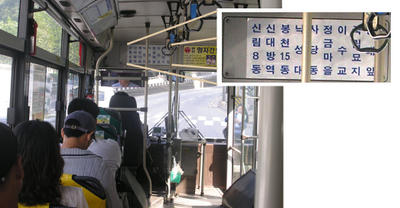
As you can see, it goes to 봉천1.5동. I looked on a map and am able to locate 봉천1동 and 봉천2동 but 봉천1.5동 is nowhere to be seen. It must reside in another dimension. Unfortunately I was going the other direction so I never got to experience the dimensional shift.

9/22/2005
The Isle of the Overgrown Ridge, Revisited
Here is a much-delayed post on 7 mysteries of that mysterious island of mystery.


- 바다색

Judging by their 감탄 when they get off the ferry from the mainland, there are two things that every visitor is impressed with. They are the hue of the water and the relative lack of polution (which of course results in clear water). The water is a beautiful sapphire blue. Not the bright turquiose that you see at tropical beaches in Thailand, the Maldives, etc., etc., but a deep rich blue color. In spite of many efforts by the Sanchon Hunjang involving polarizers, tripods and long exposure times, different angles and even post-photo tweaking in Photoshop and Gimp, the blue of the water refused to be captured satisfactorally in an image. It's a real mystery that has to be experienced first-hand. - Why so many churches
We stayed at 추산일가 (more on this place later), which is situated in an ultra-small vilagette of less than 20 people. Nonetheless it is equipped with a church and a sparkling new Buddhist temple. 추산일가 is a few kilometers down the road from the nearest village proper, 천부. Now 천부 is a real village. It has a population of 450. 천부 also has its own dock for fishing boats, a couple of butcher shops, several smaller supermarkets and no less than four churches of its own! The real irony is when we stopped by the butcher's for some 삼겹살 to barbeque, they were all getting ready to go to church. In the Catholic facility located a third of the way around the island! Churches are popular in Korea, but they seem way over done on 울릉도. The big mystery is how all these churches are supported. - Who pays for all the construction
The ring-road that goes about three-quarters of the way around the island is perched precariously close to the ocean in many places. There have been several typhoons that have swept large pieces of road out to sea, or caused 산사태 to descend upon the road and make it useless. Indeed, if you take the ferry around the island, you can still see traces of where the now unused portions of the road hang in several different places along the cliffs. It has been rebuild many times and was under construction to repair from the last typhoon when we were there in August. They were also working on a new tunnel through some of the mountains. Now since these are Korean roads, they are poured concrete. And one of the principal ingredients of concrete is sand, but there is no sand to be had on 울릉도. Every precious grain has to be imported. So all of this endless construction must be very expensive. Fishing for 오징어 and growing 더덕 must be incredibly lucrative if it can support all of the locals as well as the endless construction. Who pays for all of this construction is another mystery. - Why is the 독도 issue an even larger issue on 울릉도

According to the Korean administrative district allocation, 독도 belongs to 경상북도 울릉군. On a clear day, which is hard to come by because most of them are quite hazy, you can see 독도 as a couple of small rocks on the horizon from the lookout point above the ferry dock in 도동. If you descend from the lookout on a 민족적인 high, you can also visit the 독도 박물관 located right next to the cable car that gets you to the lookout. It is also possible to reserve a seat on a boat tour of 독도 from the ferry terminal at 도동. It costs 37,500원 per head, you have to make your reservation a day in advance and they can cancel the stop at 독도 on a whim, but it is possible to visit 독도 from 울릉도. The boat leaves at 10:00. Given the proximity and fact that everyone seems busy with their own lives, I didn't expect the 독도 thing to be bigger in 울릉도 than on the peninsula. But it was everywhere. Including that lovely 뽕짝 masterpiece by the honorary 군수 of 독도, 정광태. It is a mystery to me why the 울릉 people are so fired up about the 독도 issue and whether it does any good to have the ordinary populace fired up over such an issue. And if it does, how about when you go beyond 독도, and lay claim to much more?
- Why do all ferries only call at 도동

울릉도 sits in the East Sea, so it's western face is closest to land. Since fishing is one of the biggest industries on 울릉도, the coast is sprinkled with docks large and small. So why is it that the ferries from the peninsula slide past the west face of the island and call at 도동, which is on the east face of the island. I could understand if they were calling at the population center, but that would be 저동, which is over the hill from 도동 by land, or about 10~15 minutes farther north by sea. Since the port of call is 도동, that means everyone who has not signed up for a 대아여행사 package with forced lodging at their new resort on the hill is going to be hooked by one of the 민박mongers that line the streets when the ferries arrive. They will all be sleeping in 도동. There are ferries that arrive from three different cities on the mainland: 포항(경상도), 묵호(강원도) and 후포(강원도). It's a mystery why they all call at the same port on the east side of the island.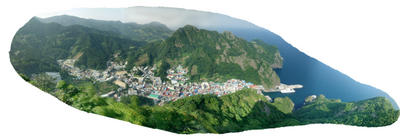
- What is up with this haze
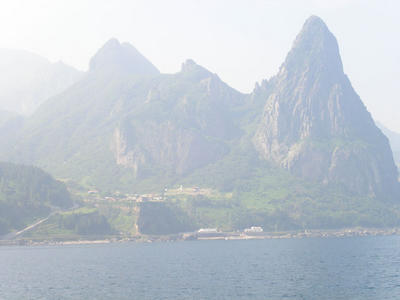
There is a semi-permanent haze that has settled over the island that prevents visitors from getting a clear view of 독도, not to mention the photographs that they would like of 울릉도. Three trips to 울릉도 so far and I have yet to get nice photos. Certainly I am not to blame ^^. This haze doesn't have the brownish tint of smog, but is similar in its effect of limiting visibility of far-away things. I'm from a desert--nowhere near the ocean--so I can't be sure, but this appears to be a normal ocean phenomenon. - Why doesn't everyone stay at 추산일가
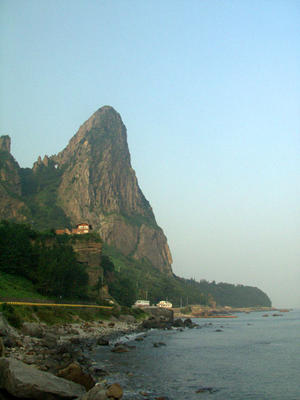
I admit there's not really much mystery here. It all comes down to the fact that (1) nobody knows much about where to stay before they come to 울릉도, (2) 추산일가 is not that famous, and (3) it's very out of the way so it is a pain to get to and get out. Still, I think the facilities are nice and the view can't be beat. Nestled up under 송곳산 on top of a cliff with an inobstructible view of the sea. I don't exactly want it to show up in the next edition of Lonely Planet and have them start serving banana pancakes and museli but I have met many people who said something like, "I wished I had known there was an opiton like that available before I booked my crappy little 민박 that doesn't even have an ocean view." If you're considering a trip to 울릉도, consider staying at 추산일가!


On the subject of ratios of facilites to population, there was also a room salon in 천부. I'm not sure how that could be a viable business in a town of 450, but at least there weren't four of them.
This bright young woman has nothing to do with 울릉도, but her attitude is impressive. While studying for the international diplomacy 고시, this SNU English Education major discovered that 독도 is classified as an international site of border dispute. Her diplomatic response? "우리땅인데.." Brilliant. Now that she has passed the 외무고시 with the highest marks, she has surprised the nation by putting her convictions into action. She has volunteered to work at the Cyber 독도 Government Office.
9/19/2005
A riddle
The Sanchon Hunjang was bored at home on this long holiday. So I pulled down 정민's 한시 미학 산책 and flipped through a couple of his essays. One of them included this story that he, in turn, took from 골계총서 滑稽叢書, which, for lack of better information, I will have to assume means the 골계전 滑稽傳 collection of funny stories by that indefatiguable Korean statesman and writer of anthologies, 서거정 (1420-1488 A.D.).
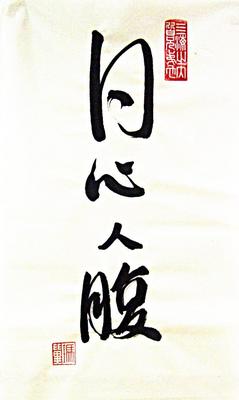
☞ 日: 날 일, 心: 마음 심, 人: 사람 인, 腹:배 복.
푸하하하하하하하하!
Once upon a time, there was a village leader who had a concubine that was very bright. There was also a younger man in the village, whose company the village leader greatly enjoyed. The two were very close and didn't bother with formaility between them. One day the leader and his concubine were out in a garden pavilion, enjoying the sights of spring, when a servant arrived with a note from the young man. The note had 4 words:

☞ 日: 날 일, 心: 마음 심, 人: 사람 인, 腹:배 복.
No matter how he examined the note, the leader couldn't make sense of it. His concubine took a glance at it and immediately started laughing. "What are you having such a hard time with? The 'day 日' is written very long so it's a long day. The 'heart 心' is missing a dot, so it is '무점심 無點心,' he hasn't had any lunch. The 'person 人' is written very small so it is '소인' or 'I.' And 'stomach 腹'is missing a line, so it is empty inside."
그러니까 "길고 긴 날 점심이 없으니, 소인의 뱃 속이 비었습니다. 밥 달란 말이옵니다."
푸하하하하하하하하!
9/17/2005
Shhhhhhhhhhhh, they're sleeping!
Update on the 산촌 fish killer. The carnage today is a bit worse than usual.

Or maybe they're just sleeping.
Notice that he's being more honest now and has taken down the 살아 있는 가을 전어 sign. His conscience must have been bothering him.
☞ Oh, and before I forget: 메리 Chew-Suck!

Or maybe they're just sleeping.
Notice that he's being more honest now and has taken down the 살아 있는 가을 전어 sign. His conscience must have been bothering him.
☞ Oh, and before I forget: 메리 Chew-Suck!
9/15/2005
생선 그렇게 좋아하면 노량진수산시장에나 가지
Folk around here don't really appear to be that into fish. At least that's the impression that the Hunjang gets from observing our local 횟집.
The owner keeps killing fish! Well, I guess that's not so unusual for a 횟집, but let me explain--
The 횟집 has got a whole wall of tanks, always stocked with all sorts of frutti di mare. But every time I walk by, I start thinking that the owner must be a little fruity. Every morning, without fail, there are several fish floating belly up in his tanks. Usually it's a few of the bigger ones.
And, while there's usually a customer or two in there eating dinner, I never see him do a thriving business.
The only thing I can imagine is that he is gouging his few customers to more than offset the cost of the fish that he keeps throwing out.
But business must be better than it appears (and certainly better than 생선나라), because recently a new tank has appeared. A circular beauty that sits outside of the front door and impedes pedestrian traffic. It is a wonderful thing to behold.

This being early autumn and all, he has stocked his new round tank with that delectable fall treat, 가을 전어.
But...
True to form, the tank has about a dozen 전어, maybe more, floating belly-up in the tank as the aeration jets push their dead carcasses in circles. In the interest of truth in advertising, he really ought to change the sign to read "죽어 있는 가을 전어."
군침 돌게 하네...
The owner keeps killing fish! Well, I guess that's not so unusual for a 횟집, but let me explain--
The 횟집 has got a whole wall of tanks, always stocked with all sorts of frutti di mare. But every time I walk by, I start thinking that the owner must be a little fruity. Every morning, without fail, there are several fish floating belly up in his tanks. Usually it's a few of the bigger ones.
And, while there's usually a customer or two in there eating dinner, I never see him do a thriving business.
The only thing I can imagine is that he is gouging his few customers to more than offset the cost of the fish that he keeps throwing out.
But business must be better than it appears (and certainly better than 생선나라), because recently a new tank has appeared. A circular beauty that sits outside of the front door and impedes pedestrian traffic. It is a wonderful thing to behold.

This being early autumn and all, he has stocked his new round tank with that delectable fall treat, 가을 전어.
But...
True to form, the tank has about a dozen 전어, maybe more, floating belly-up in the tank as the aeration jets push their dead carcasses in circles. In the interest of truth in advertising, he really ought to change the sign to read "죽어 있는 가을 전어."
군침 돌게 하네...
9/14/2005
Rustled cattle and grammar points
Alright. How long has it been since you started learning Korean? The Sanchon Hunjang will be administering a little language quiz today:
How would you say "An old man in his seventies, whose cow was stolen..."?
☞ According to the paper, it is "소를 도둑 맞은 70대 할아버지가...
I'm sure I could have come up with some muddling way to express the idea, but I would never have thought to say it this way. I didn't realize that you could make 도둑 맞은 work as a single unit and take the object of the stealing.
And speaking of odd single-units in Korean, how about all those words that end in that elevating suffix ~님.
I think the key lies in the 소를 도둑 맞는 principle. In some words, the ~님 may have started out as an elevating suffix but now it has just became a natural part of a few nouns. They have fused into a single unit. Since it's just one unit, it no longer sounds strange to call yourself 선생님 or 벗님. That's my new idea, anyway. Which is not to say that teachers don't call each other 선생 (sans ~님), but there seems to be a bit of single-unit-ness about words like 선생님.
(More of the newspaper article about the old man and his cow, just in case anyone was curious about more details than the grammar of the title.
소를 도둑 맞은 70대 할아버지가 ‘횡재’를 했다.
도둑 맞은 암소가 19일만에 새끼를 낳아 자신의 품으로 돌아온 것이다. 그야말로 '새옹지마(塞翁之馬)'가 아닌 '새옹지우(塞翁之牛)'셈이다.전남 여수시 화양면 서촌리에 사는 김모(74) 할아버지가 12년생 암소와 2년생 암소 2마리를 도둑 맞은 것은 지난 달 12일. 김 할아버지는 아침에 소 먹이를 주려고 축사에 나왔다 깜짝 놀랐다... Swiped via Naver.
Say...that's pretty clever how they turned the border geezer's horse into the border geezer's cow, too.)
How would you say "An old man in his seventies, whose cow was stolen..."?
☞ According to the paper, it is "소를 도둑 맞은 70대 할아버지가...
I'm sure I could have come up with some muddling way to express the idea, but I would never have thought to say it this way. I didn't realize that you could make 도둑 맞은 work as a single unit and take the object of the stealing.
And speaking of odd single-units in Korean, how about all those words that end in that elevating suffix ~님.
- I once knew this assiduous student of Korean who puzzled long and hard over the name of the group 벗님들. Of course that was before he fell in love with 박해받은 노동자의 해방 poetry. At any rate, he reasoned that, since the suffix has the elevating effect, it surely couldn't be used in speaking about oneself. Just like you can't say "*나님께서는 진지드시겠습니다." Well, I guess you could say that, but it wouldn't be in good form. And it certainly wouldn't be a native speaker kind of thing to do. So how could these guys call themselves 벗님들?
- And how about 손님? If you're a regular customer, and you have occasion to mention that fact, you can't very well say "*나는 단골손이야."
- I frequently see teachers who, when talking to their students, refer to themselves as "선생님." For instance, "선생님이 잠깐 나갔다 올께." I even cornered one of them and quizzed her down about it. Her response was "we do that to teach the kids that they need to call the teacher 선생님." But that doesn't hold much water when you realize that, if this were the case, they should be attaching the elevating verb infix ~시, too. Then we'd be back to that *나님께서 stuff again.
I think the key lies in the 소를 도둑 맞는 principle. In some words, the ~님 may have started out as an elevating suffix but now it has just became a natural part of a few nouns. They have fused into a single unit. Since it's just one unit, it no longer sounds strange to call yourself 선생님 or 벗님. That's my new idea, anyway. Which is not to say that teachers don't call each other 선생 (sans ~님), but there seems to be a bit of single-unit-ness about words like 선생님.
(More of the newspaper article about the old man and his cow, just in case anyone was curious about more details than the grammar of the title.
도둑 맞은 암소가 19일만에 새끼를 낳아 자신의 품으로 돌아온 것이다. 그야말로 '새옹지마(塞翁之馬)'가 아닌 '새옹지우(塞翁之牛)'셈이다.전남 여수시 화양면 서촌리에 사는 김모(74) 할아버지가 12년생 암소와 2년생 암소 2마리를 도둑 맞은 것은 지난 달 12일. 김 할아버지는 아침에 소 먹이를 주려고 축사에 나왔다 깜짝 놀랐다... Swiped via Naver.
Say...that's pretty clever how they turned the border geezer's horse into the border geezer's cow, too.)
9/13/2005
To your helssu
On the way out every weekend, the Sanchon Hunjang has to walk by this shop with the name 종로건강원. I think it's great. A center devoted to my--and everyone's--health. But the health food on offer here is kinda weighted to only one gender. Actually, it seems to be focused on one body part of that particular gender...
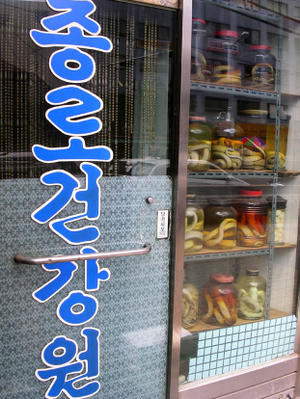
Yep. Bottle after bottle of 뱀소주. Sure to flog the flagging stamina of any guy.
Of course if 뱀소주 is not your thing, you can always get a 해구신. I'm not quite sure how these things are harvested...

...but judging by the piles in the traditional markets, there are a lot of unhappy water puppies out there.
And on the subjects of stamina and 해구신 海狗腎... According to my 옥편, the word 신 腎 means kidney (콩팥). "Kidney" would sure be a nice euphemism for the part of the seal that they're selling. But there's a little note that starts with 國(국) enclosed in a circle--the cue that a Chinese word has been given a special meaning only in Korea--and says it is also "자지(신)." But this makes it difficult to explain the wealth of Chinese and Japanese sites that use the same phrase. At any rate, this word appears to be used as a sort of cultured way to refer to penes.
Some time ago, we had a lunch appointment with some guys from a local bank. Those bank guys really love Chinese hotpot, so we went to a restaurant called 중경신선로 to have their "신선로" (which is their Korean translation for huoguo, not to be confused with the real Korean 신선로). They ordered for us and for the huoguo meat, they chose cow penis. The younger guys around the table were all saying "소 자지," but our resident big-wig called them on their lack of manners, "'자지?' '자지'가 뭐냐? 소의 '신'이라고 해야지." Call it what you want, there was a lot of sausage swimming in that soup.

Yep. Bottle after bottle of 뱀소주. Sure to flog the flagging stamina of any guy.
Of course if 뱀소주 is not your thing, you can always get a 해구신. I'm not quite sure how these things are harvested...

...but judging by the piles in the traditional markets, there are a lot of unhappy water puppies out there.
And on the subjects of stamina and 해구신 海狗腎... According to my 옥편, the word 신 腎 means kidney (콩팥). "Kidney" would sure be a nice euphemism for the part of the seal that they're selling. But there's a little note that starts with 國(국) enclosed in a circle--the cue that a Chinese word has been given a special meaning only in Korea--and says it is also "자지(신)." But this makes it difficult to explain the wealth of Chinese and Japanese sites that use the same phrase. At any rate, this word appears to be used as a sort of cultured way to refer to penes.
Some time ago, we had a lunch appointment with some guys from a local bank. Those bank guys really love Chinese hotpot, so we went to a restaurant called 중경신선로 to have their "신선로" (which is their Korean translation for huoguo, not to be confused with the real Korean 신선로). They ordered for us and for the huoguo meat, they chose cow penis. The younger guys around the table were all saying "소 자지," but our resident big-wig called them on their lack of manners, "'자지?' '자지'가 뭐냐? 소의 '신'이라고 해야지." Call it what you want, there was a lot of sausage swimming in that soup.
9/12/2005
해석이 문제지
The Hunjang spends a fair bit of time commuting, mostly from the 산촌 to work and back. And I like to have a book in-hand to make the time pass faster.
I was looking for something to read and flipped through a few books. In this flipping, the Hunjang came across some of what have to be the most obtuse and forced sentences ever.
Most people know that (in the pre-modern era, anyway), Chinese words each have a meaning attached to them, but their actual part of speech in any sentence is determined by the location in that sentence. So a word like 馬: 말 마 could be a noun (horse), a verb (to act or be like a horse), an adverb (in a horse-like manner) and so on. In the interest of simplicity, let's not get into that bizarre 白馬非馬 (백마비마) dialogue. Okay, that should be all the background you need.
Please translate the following:
龍 雨 龍 雨 龍 雨 龍 龍 龍 不 雨 龍 龍 龍 雨 龍 雨。
☞ Those would be 龍: 미르 용, 雨: 비 우, and 不: 아니 불
Got it?
Would punctuation help? It's not the traditional approach, but okay:
龍, 雨! 龍, 雨! 龍雨, 龍龍. 龍不雨, 龍龍? 龍, 雨! 龍, 雨!
Does that help?
The 해석 is supposed to be...ahem..."용아 비를 내리게 하라! 용아 제발 비를 내리게 하라! 용이 비를 내리게 하여야 용이 참다운 용이지, 용이 비를 내리게 할 수 없다면 어찌 참다운 용이 되겠느냐? 용아 비를 내리게 하라! 용아 제발 비를 내리게 하라!"
Was that one too easy?
This next one is credited to at least several Korean scholars, including the wild and crazy 김삿갓:
是是非非非是是,
是非非是非非是.
是非非是是非非,
是是非非是是非.
☞ 是: 옳을 시, 非: 아닐 비
해석? I'm glad you asked.
옳은 것 옳다 하고 그런 것 그르다 함, 이 것이 옳음 아니고,
그른 것 옳다 하고 옳은 것 그르다 함, 옳지 않음 아닐세.
그른 것 옳다 하고 옳은 것 그르다 함, 이 그럼이 아닐진대,
옳은 것 옳다 하고 그른 것 그르다 함, 이 것이 시비로구나.
This is very much in the same vein as these two lines that have been attributed to 김시습 (1435 - 1493). Since it's the same pattern, how hard could this one be?
同異異同同異異,
異同同異異同同.
☞ 同: 한가지 동, 異: 다를 이
Which, of course, comes out as:
다른 것 같다 하고 같은 것 다르다 하니, 같고 다름이 다르고,
같은 것 다르다 하고 다른 것 같다 하니, 다르고 같음이 같구나.
There is one last one, and this one has a story as an added bonus.
Quick background: During the Chinese Han 한 漢 dynasty there was a woman named 왕소군 王昭君, who was one of ancient China's four famous beauties, in the harem of Emperor Yuan 원 元. He had too many women in his harem to "service" them all regularly. He had his painter go paint portraits of the ladies so he could pick his company each evening on the basis of the paintings. Most of the ladies bribed the painter to use his artistic license on their behalf. 왕소군 was too upright and sure of her beauty to bribe the man and he painted an unflattering portrait. Later, the Emperor had occasion to wed one of his harem off to the barbarians on the border in order to ensure peace. On the basis of the portrait, he picked 왕소군. He saw her at the sendoff and realized that she was very beautiful, but it was too late to do anything. She rode off into the Mongolian sunset. Later poets loved her tragic story and there is a famous poem about her that ends in the following lines:
胡地無花草, As that barbarian land does not have flowering grasses,
春來不似春. Though spring comes, it doesn't seem like spring.
☞ 胡: 오랑캐 호, 地: 따 지, 無: 없을 무, 花: 꽃 화, 草: 풀 초, 春: 봄 춘, 來: 올 래, 似: 같을 사.
Once in the 조선 dynasty a local magistate was administering a low-level examination for those who wished to begin a career in the government. The exam required the hopeful testees to compose a poem on an assigned topic, and the topic assigned for this particular exam was "胡地無花草" (the first line above). When the answer sheets were collected, the magistrate found that, as would be expected, most were eloquent rhapsodies on 왕소군 and her plight. But the magistrate was overcome by the brilliance of one author in particular, and he awarded the that man highest marks on the exam.
His poem?
胡地無花草,
胡地無花草?
胡地無花草,
胡地無花草!
해석?
오랭캐 땅이라 화초가 없다 하나
오랑캐 땅엔들 화초가 없을까?
어찌 땅에 화초가 없으랴만
오랑캐 땅이라 화초가 없도다!
Lest you doubt the truth of this verse, I invite you to take a look at 오랑캐 땅 for yourself. See any flowering grasses? ^^
I was looking for something to read and flipped through a few books. In this flipping, the Hunjang came across some of what have to be the most obtuse and forced sentences ever.
Most people know that (in the pre-modern era, anyway), Chinese words each have a meaning attached to them, but their actual part of speech in any sentence is determined by the location in that sentence. So a word like 馬: 말 마 could be a noun (horse), a verb (to act or be like a horse), an adverb (in a horse-like manner) and so on. In the interest of simplicity, let's not get into that bizarre 白馬非馬 (백마비마) dialogue. Okay, that should be all the background you need.
Please translate the following:
龍 雨 龍 雨 龍 雨 龍 龍 龍 不 雨 龍 龍 龍 雨 龍 雨。
☞ Those would be 龍: 미르 용, 雨: 비 우, and 不: 아니 불
Got it?
Would punctuation help? It's not the traditional approach, but okay:
龍, 雨! 龍, 雨! 龍雨, 龍龍. 龍不雨, 龍龍? 龍, 雨! 龍, 雨!
Does that help?
The 해석 is supposed to be...ahem..."용아 비를 내리게 하라! 용아 제발 비를 내리게 하라! 용이 비를 내리게 하여야 용이 참다운 용이지, 용이 비를 내리게 할 수 없다면 어찌 참다운 용이 되겠느냐? 용아 비를 내리게 하라! 용아 제발 비를 내리게 하라!"
Was that one too easy?
This next one is credited to at least several Korean scholars, including the wild and crazy 김삿갓:
是是非非非是是,
是非非是非非是.
是非非是是非非,
是是非非是是非.
☞ 是: 옳을 시, 非: 아닐 비
해석? I'm glad you asked.
옳은 것 옳다 하고 그런 것 그르다 함, 이 것이 옳음 아니고,
그른 것 옳다 하고 옳은 것 그르다 함, 옳지 않음 아닐세.
그른 것 옳다 하고 옳은 것 그르다 함, 이 그럼이 아닐진대,
옳은 것 옳다 하고 그른 것 그르다 함, 이 것이 시비로구나.
This is very much in the same vein as these two lines that have been attributed to 김시습 (1435 - 1493). Since it's the same pattern, how hard could this one be?
同異異同同異異,
異同同異異同同.
☞ 同: 한가지 동, 異: 다를 이
Which, of course, comes out as:
다른 것 같다 하고 같은 것 다르다 하니, 같고 다름이 다르고,
같은 것 다르다 하고 다른 것 같다 하니, 다르고 같음이 같구나.
There is one last one, and this one has a story as an added bonus.
Quick background: During the Chinese Han 한 漢 dynasty there was a woman named 왕소군 王昭君, who was one of ancient China's four famous beauties, in the harem of Emperor Yuan 원 元. He had too many women in his harem to "service" them all regularly. He had his painter go paint portraits of the ladies so he could pick his company each evening on the basis of the paintings. Most of the ladies bribed the painter to use his artistic license on their behalf. 왕소군 was too upright and sure of her beauty to bribe the man and he painted an unflattering portrait. Later, the Emperor had occasion to wed one of his harem off to the barbarians on the border in order to ensure peace. On the basis of the portrait, he picked 왕소군. He saw her at the sendoff and realized that she was very beautiful, but it was too late to do anything. She rode off into the Mongolian sunset. Later poets loved her tragic story and there is a famous poem about her that ends in the following lines:
胡地無花草, As that barbarian land does not have flowering grasses,
春來不似春. Though spring comes, it doesn't seem like spring.
☞ 胡: 오랑캐 호, 地: 따 지, 無: 없을 무, 花: 꽃 화, 草: 풀 초, 春: 봄 춘, 來: 올 래, 似: 같을 사.
Once in the 조선 dynasty a local magistate was administering a low-level examination for those who wished to begin a career in the government. The exam required the hopeful testees to compose a poem on an assigned topic, and the topic assigned for this particular exam was "胡地無花草" (the first line above). When the answer sheets were collected, the magistrate found that, as would be expected, most were eloquent rhapsodies on 왕소군 and her plight. But the magistrate was overcome by the brilliance of one author in particular, and he awarded the that man highest marks on the exam.
His poem?
胡地無花草,
胡地無花草?
胡地無花草,
胡地無花草!
해석?
오랭캐 땅이라 화초가 없다 하나
오랑캐 땅엔들 화초가 없을까?
어찌 땅에 화초가 없으랴만
오랑캐 땅이라 화초가 없도다!
Lest you doubt the truth of this verse, I invite you to take a look at 오랑캐 땅 for yourself. See any flowering grasses? ^^
9/08/2005
아는 분이셔?
The Hunjang was out walking around again and happened across this sign. The man on the sign especially caught my eye.
Have you seen this man before?

Look closely at the face.
Look familiar?
Judging by the pose and the baby-kissing smile, he must be a politician, right?
The thumbs-up gesture clinches it.
It's got to be from a campaign poster, right?
(Beats me what makes anyone think a pose like that generates trust, though.)
Nope, sorry.
All wrong.
This sign was not a campaign poster. This guy's not a politician (at least not yet). The poster came from...
...from...
Click here for more detail that should make it clear who he is.
Talk about a guy who missed his calling in life! But, would you trust your precious baby to this guy?
※ Regular readers have probably noticed that the Sanchon features a never-ending collection of bizarre signs. Anyone interested in moving in? See your local realtor quick!
Have you seen this man before?

Look closely at the face.
Look familiar?
Judging by the pose and the baby-kissing smile, he must be a politician, right?
The thumbs-up gesture clinches it.
It's got to be from a campaign poster, right?
(Beats me what makes anyone think a pose like that generates trust, though.)
Nope, sorry.
All wrong.
This sign was not a campaign poster. This guy's not a politician (at least not yet). The poster came from...
...from...
Click here for more detail that should make it clear who he is.
Talk about a guy who missed his calling in life! But, would you trust your precious baby to this guy?
※ Regular readers have probably noticed that the Sanchon features a never-ending collection of bizarre signs. Anyone interested in moving in? See your local realtor quick!
9/07/2005
따옴표 사랑, 나라 사랑
Sometimes people like to make "quotation marks" in the air when using words in other than the normal way. Indeed, the Sanchon Hunjang has known people who do this every other sentence and it gets annoying quickly.
The Hunjang was on a bus today and noticed that somebody at the bus company has caught this disease:
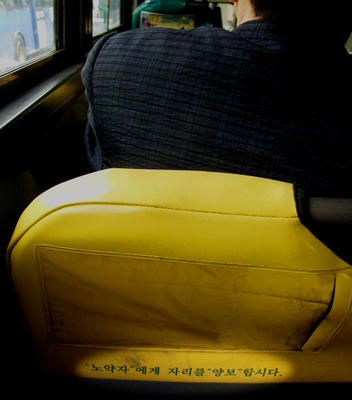
Um...let me get this right...so I'm supposed to "yield" my seat to the "old and weak"? Using the irony cued by the 따옴표, I take that to mean, "when you encounter people who are pretending to be old or frail in order to score a seat on the crowded bus, pretend to yield your seat to them." 아싸! That means I'm going to be sitting down the whole way home!
Unfortunately, it seems that those little smileys and things aren't the only differences in the use of punctuation marks in Korea. They also use a semi-colon to set off list titles (like date, time, place),where a colon would work in English.
And these quotation marks are supposed to indicate emphasis, like italics in English. I used to try and use italics in Korean for emphasis at work. My superiors really hate the 기울어진 글자, instead preferring bold or quote mark 처리. Who knew...?
The Hunjang was on a bus today and noticed that somebody at the bus company has caught this disease:

Um...let me get this right...so I'm supposed to "yield" my seat to the "old and weak"? Using the irony cued by the 따옴표, I take that to mean, "when you encounter people who are pretending to be old or frail in order to score a seat on the crowded bus, pretend to yield your seat to them." 아싸! That means I'm going to be sitting down the whole way home!
Unfortunately, it seems that those little smileys and things aren't the only differences in the use of punctuation marks in Korea. They also use a semi-colon to set off list titles (like date, time, place),where a colon would work in English.
And these quotation marks are supposed to indicate emphasis, like italics in English. I used to try and use italics in Korean for emphasis at work. My superiors really hate the 기울어진 글자, instead preferring bold or quote mark 처리. Who knew...?
9/02/2005
What is this 산촌훈장 crap, anyway?
※ A power outage this morning appears to have destryoed a/some sector(s) on the Sanchon Hunjang's hard drive and caused all of the 울릉도 photos to disappear. This means I'll have to postpone the 울릉도 post until I see if I can recover those files. In the meantime...
My loyal reader asked what this Sanchon Hunjang is all about and what's up with all the Chinese in the header.
The Chinese words are easy enough:
Those are the words. But for the background, we'll have to go waaaaaay back.
Scoot over here close to the fire and I'll spin you a yarn.
The Chinese word we use for "poetry" 詩 has been a rhymed genre since the beginning of Chinese literature, the Book of Poetry 시경 詩經. As time went by, this genre split into several branches, but they all had the same number of words per line, and they were rhymed. That is the definition of a 詩 poem (although the same number of words per line thing doesn't strictly hold true to the dawn-of-history stuff).
The Chinese gradually built up some very specific ideas about what makes a technically great poem (that is, great in technique, not necessarily in content). They invented rules governing the pattern of tones so there would be variation and please the ear. They also put together a list of "official rhymes." Now China's a big place with lots of local variation in pronunciation. Not only that, but sounds change over time. This means that the words on the official list of rhymes may or may not rhyme to the poet in his region and timeframe (think of Dolly Parton rhyming "thing" and "sang"). But then they gave a good incentive for everyone to memorize those rhyme tables and practice writing technically correct poems at every occasion: they made the writing of such poems the touchstone to select men of quality for appointment to chushy and well-paid government jobs. Riches and prestige. Everyone wanted one of those government jobs.
Since the ability to pull together a poem was the mark of the elite, everyone practiced long and hard. And they made games involving the composition of poetry. For example, they would pick a topic and 4 or 5 rhyming words and everyone had to use those words at the end of the rhyming lines of his poem about the selected topic. Or you could use the same rhyming words from a poem that someone had sent to you and reply to them with a different poem, same rhyming words at the ends of the lines. And so on...and so on...and so on... all in the name of fun and practice.
And of course Korea was like a younger brother who had to do everything big brother does. Only with more intensity.
Okay, that's the deep background.
Now, then...
During the latter part of the ChosOn Dynasty (1392-1910 A.D.) there was a man of aristocrat stock whose family had lost their status. The reason for their fall from grace was that the man's grandfather had been local magistrate in SOnch'On when they had an uprising in the area and the grandfather surrendered to the traitors. The grandson was educated but, owing to this disgrace, he could not get one of those government jobs that everybody was salivating for. He gave up on the whole charade and just started drifting from place to place writing satirical verses and wearing a lampshade hat 삿갓. There are some pretty amusing verses and stories attributed to him. Because of his ever-present lampshade, he picked up the nickname 김립 金笠, where 립 means 삿갓. Nowadays everyone knows him as 김삿갓 (1807~1863). In the 1990s, there was even a honey-sweetened 소주 named after him, but it has since gone the way of its namesake.
Anyhow, one day 김삿갓 was passing through this mountain village late in the evening. Since he needed a place to sleep, and was no stranger to begging, he asked the 훈장 at the village school to put him up for the night. The village schoolmaster wasn't about to put up any old lout--only one that could compose proper Chinese poetry on the spot. So the terms for a night's stay at the academy were that 김삿갓 would have to compose a 4 line poem with the rhyming characters to be supplied by the 훈장 after each line was complete.
Unfortunately the CNN videotape of the exchange has been lost, but I imagine it went something like this:
훈 장 thinks to self: If I start off with a somewhat obscure rhyme character that's dificult to rhyme to boot, maybe this guy will just disappear really quickly.
훈장: 찾을 멱
김립: (Composing poem) Of all the rhyme characters, why does it hafta be 멱? (許多韻字何呼覓)
훈장 thinks to self: Oh-hoh. A smarty pants. Well let's see how he likes this.
훈장: 찾을 멱
김립: I already did that one.
훈장: No, 멱 is the first and the second rhyme character.
김립: Okay, here goes...(Composing) That last 멱 was hard enough, it's going to be really tough to work in this 멱. (彼覓有難況此覓)
훈장 thinks to self: Heh heh heh. I've got him now. He's composed himself into a corner.
훈장: 찾을 멱
김립: This night's rest hangs on 멱 (一夜肅寢懸於覓)
훈 장 thinks to self: huh? where's he going to go with this one? Eh...who cares there's only one line left and there's no way he's going to be able to pull off a poem that means anything from here.
훈장: 찾을 멱
김립: (fighting to repress grin) Maybe the only thing this mountain village schoolmaster knows is 멱 (山村訓長但知覓)
훈장: Doh! I hope a bedbug bites your ugly butt.
So, there you have it. "The only thing the schoolmaster of [this] mountain village knows is myOk."
산촌훈장이나 노태우(盧泰愚)나 이름에서 볼 수 있듯이 바보거든. 아는 게 다행이라고 생각하고 있지? ^^
My loyal reader asked what this Sanchon Hunjang is all about and what's up with all the Chinese in the header.
The Chinese words are easy enough:
- 山 메 산 mountain
- 村 마을 촌 village
☞ So 산촌 is a mountain village - 訓 가르칠 훈
- 長 길 장 older guy
☞ 훈장 was the schoolmaster at a Confucian academy 서원. The 훈장의 가르침 blog has more detail on the significance of 훈장. - 但 다만 단 only
- 知 알 지 knows
- 覓 찾을 멱 to search for
Those are the words. But for the background, we'll have to go waaaaaay back.
Scoot over here close to the fire and I'll spin you a yarn.
The Chinese word we use for "poetry" 詩 has been a rhymed genre since the beginning of Chinese literature, the Book of Poetry 시경 詩經. As time went by, this genre split into several branches, but they all had the same number of words per line, and they were rhymed. That is the definition of a 詩 poem (although the same number of words per line thing doesn't strictly hold true to the dawn-of-history stuff).
The Chinese gradually built up some very specific ideas about what makes a technically great poem (that is, great in technique, not necessarily in content). They invented rules governing the pattern of tones so there would be variation and please the ear. They also put together a list of "official rhymes." Now China's a big place with lots of local variation in pronunciation. Not only that, but sounds change over time. This means that the words on the official list of rhymes may or may not rhyme to the poet in his region and timeframe (think of Dolly Parton rhyming "thing" and "sang"). But then they gave a good incentive for everyone to memorize those rhyme tables and practice writing technically correct poems at every occasion: they made the writing of such poems the touchstone to select men of quality for appointment to chushy and well-paid government jobs. Riches and prestige. Everyone wanted one of those government jobs.
Since the ability to pull together a poem was the mark of the elite, everyone practiced long and hard. And they made games involving the composition of poetry. For example, they would pick a topic and 4 or 5 rhyming words and everyone had to use those words at the end of the rhyming lines of his poem about the selected topic. Or you could use the same rhyming words from a poem that someone had sent to you and reply to them with a different poem, same rhyming words at the ends of the lines. And so on...and so on...and so on... all in the name of fun and practice.
And of course Korea was like a younger brother who had to do everything big brother does. Only with more intensity.
Okay, that's the deep background.
Now, then...
During the latter part of the ChosOn Dynasty (1392-1910 A.D.) there was a man of aristocrat stock whose family had lost their status. The reason for their fall from grace was that the man's grandfather had been local magistrate in SOnch'On when they had an uprising in the area and the grandfather surrendered to the traitors. The grandson was educated but, owing to this disgrace, he could not get one of those government jobs that everybody was salivating for. He gave up on the whole charade and just started drifting from place to place writing satirical verses and wearing a lampshade hat 삿갓. There are some pretty amusing verses and stories attributed to him. Because of his ever-present lampshade, he picked up the nickname 김립 金笠, where 립 means 삿갓. Nowadays everyone knows him as 김삿갓 (1807~1863). In the 1990s, there was even a honey-sweetened 소주 named after him, but it has since gone the way of its namesake.
Anyhow, one day 김삿갓 was passing through this mountain village late in the evening. Since he needed a place to sleep, and was no stranger to begging, he asked the 훈장 at the village school to put him up for the night. The village schoolmaster wasn't about to put up any old lout--only one that could compose proper Chinese poetry on the spot. So the terms for a night's stay at the academy were that 김삿갓 would have to compose a 4 line poem with the rhyming characters to be supplied by the 훈장 after each line was complete.
Unfortunately the CNN videotape of the exchange has been lost, but I imagine it went something like this:
훈 장 thinks to self: If I start off with a somewhat obscure rhyme character that's dificult to rhyme to boot, maybe this guy will just disappear really quickly.
훈장: 찾을 멱
김립: (Composing poem) Of all the rhyme characters, why does it hafta be 멱? (許多韻字何呼覓)
훈장 thinks to self: Oh-hoh. A smarty pants. Well let's see how he likes this.
훈장: 찾을 멱
김립: I already did that one.
훈장: No, 멱 is the first and the second rhyme character.
김립: Okay, here goes...(Composing) That last 멱 was hard enough, it's going to be really tough to work in this 멱. (彼覓有難況此覓)
훈장 thinks to self: Heh heh heh. I've got him now. He's composed himself into a corner.
훈장: 찾을 멱
김립: This night's rest hangs on 멱 (一夜肅寢懸於覓)
훈 장 thinks to self: huh? where's he going to go with this one? Eh...who cares there's only one line left and there's no way he's going to be able to pull off a poem that means anything from here.
훈장: 찾을 멱
김립: (fighting to repress grin) Maybe the only thing this mountain village schoolmaster knows is 멱 (山村訓長但知覓)
훈장: Doh! I hope a bedbug bites your ugly butt.
So, there you have it. "The only thing the schoolmaster of [this] mountain village knows is myOk."
산촌훈장이나 노태우(盧泰愚)나 이름에서 볼 수 있듯이 바보거든. 아는 게 다행이라고 생각하고 있지? ^^
Archives
7월 2005 8월 2005 9월 2005 10월 2005 11월 2005 12월 2005 1월 2006 2월 2006 3월 2006 7월 2006 8월 2006 10월 2006 4월 2007 5월 2007 6월 2007 7월 2007 8월 2007 9월 2007 10월 2007 11월 2007 12월 2007 1월 2008 5월 2008 8월 2008